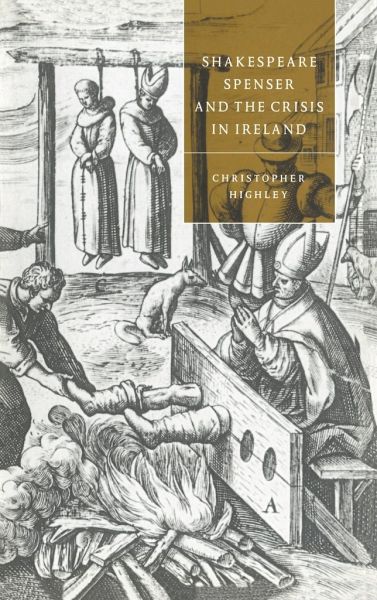
Shakespeare, Spenser, and the Crisis in Ireland
Versandkostenfrei!
Versandfertig in 1-2 Wochen
103,99 €
inkl. MwSt.

PAYBACK Punkte
52 °P sammeln!
Ireland is increasingly recognised as a crucial element in early modern British literary and political history. Christopher Highley's book explores the most serious crisis the Elizabethan regime faced: its attempts to subdue and colonise the native Irish. Through a range of literary representations from Shakespeare and Spenser, and contemporaries like John Hooker, John Derricke, George Peele and Thomas Churchyard he shows how these writers produced a complex discourse about Ireland that cannot be reduced to a simple ethnic opposition. This book challenges traditional views about the impact of ...
Ireland is increasingly recognised as a crucial element in early modern British literary and political history. Christopher Highley's book explores the most serious crisis the Elizabethan regime faced: its attempts to subdue and colonise the native Irish. Through a range of literary representations from Shakespeare and Spenser, and contemporaries like John Hooker, John Derricke, George Peele and Thomas Churchyard he shows how these writers produced a complex discourse about Ireland that cannot be reduced to a simple ethnic opposition. This book challenges traditional views about the impact of Spenser's experience in Ireland on his cultural identity, while also arguing that the interaction between English and Ireland is a powerful and provocative subtext in the work of Shakespeare and his fellow dramatists. Highley argues that the confrontation between an English imperial presence and a Gaelic 'other' was a profound factor in the definition of an English poetic self.
Table of contents:
Introduction: Elizabeth's other isle; 1. Spenser's Irish courts; 2. Reversing the conquest: deputies, rebels, and Shakespeare's The Second Part of Henry VI; 3. Ireland, Wales, and the representation of England's borderlands; 4. The Tyrone rebellion and the gendering of colonial resistance in The First Part of Henry IV; 5. 'A soft kind of war': Spenser and the female reformation of Ireland; 6. 'If the cause be not good': Henry V and Essex's Irish Campaign.
Christopher Highley's study shows how writers from the English Renaissance produced a complex discourse about Ireland that cannot be reduced to a simple ethnic opposition. Highley argues that this interaction became a profound factor in the definition of an English poetic self.
A study of the literary representation of Ireland in English Renaissance writing.
Table of contents:
Introduction: Elizabeth's other isle; 1. Spenser's Irish courts; 2. Reversing the conquest: deputies, rebels, and Shakespeare's The Second Part of Henry VI; 3. Ireland, Wales, and the representation of England's borderlands; 4. The Tyrone rebellion and the gendering of colonial resistance in The First Part of Henry IV; 5. 'A soft kind of war': Spenser and the female reformation of Ireland; 6. 'If the cause be not good': Henry V and Essex's Irish Campaign.
Christopher Highley's study shows how writers from the English Renaissance produced a complex discourse about Ireland that cannot be reduced to a simple ethnic opposition. Highley argues that this interaction became a profound factor in the definition of an English poetic self.
A study of the literary representation of Ireland in English Renaissance writing.




